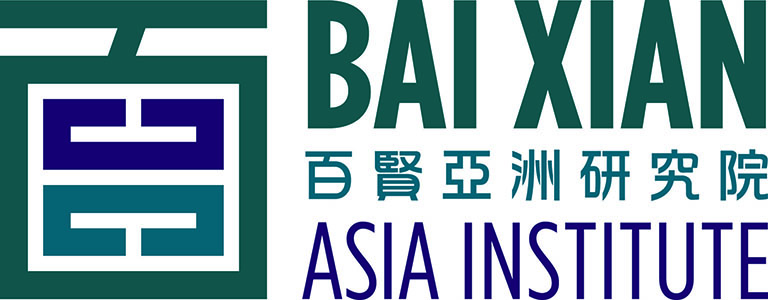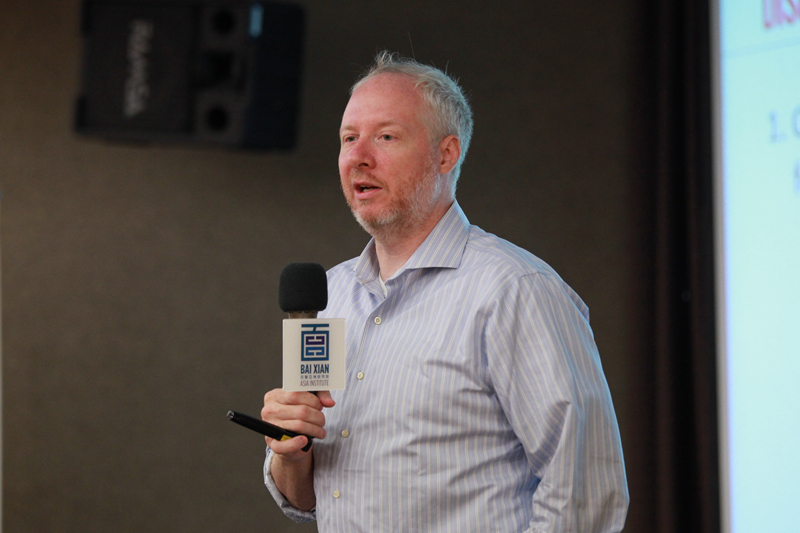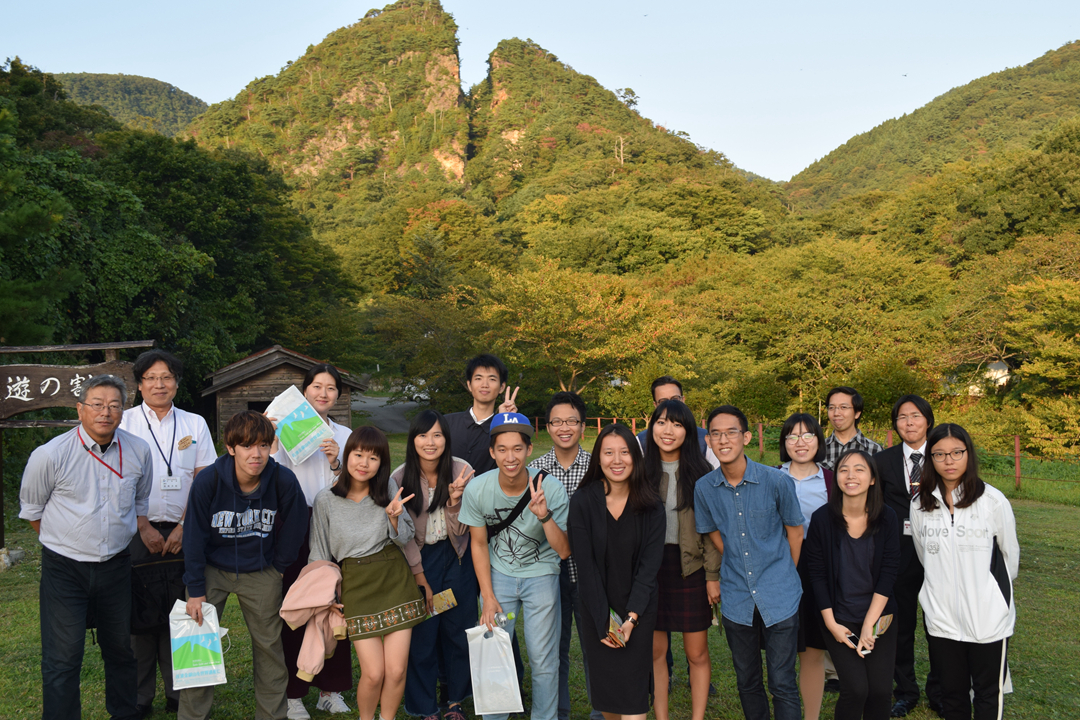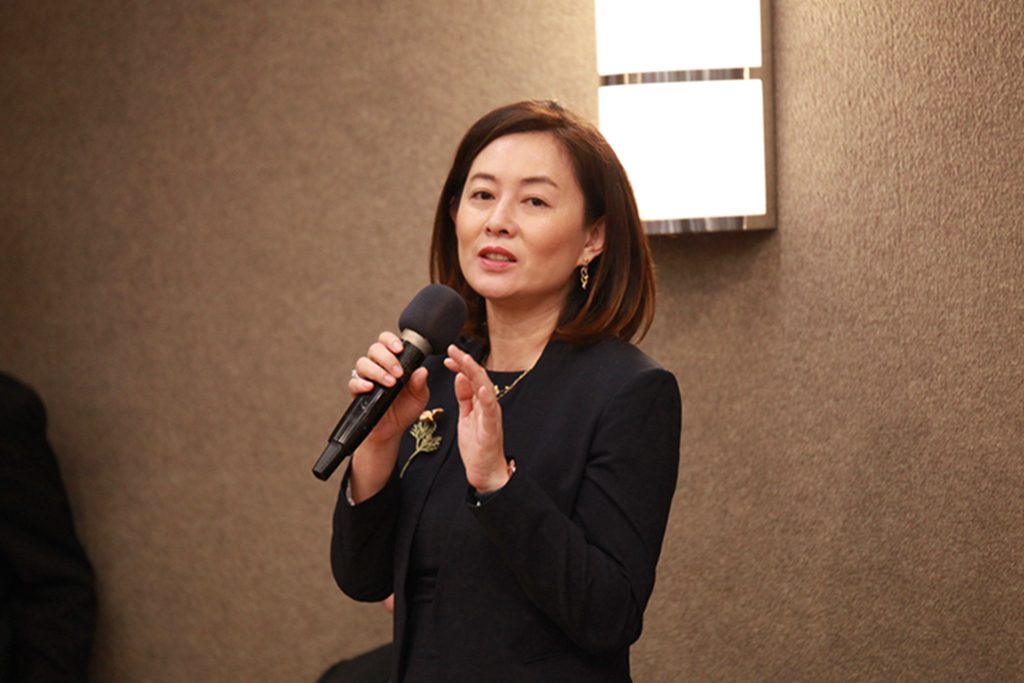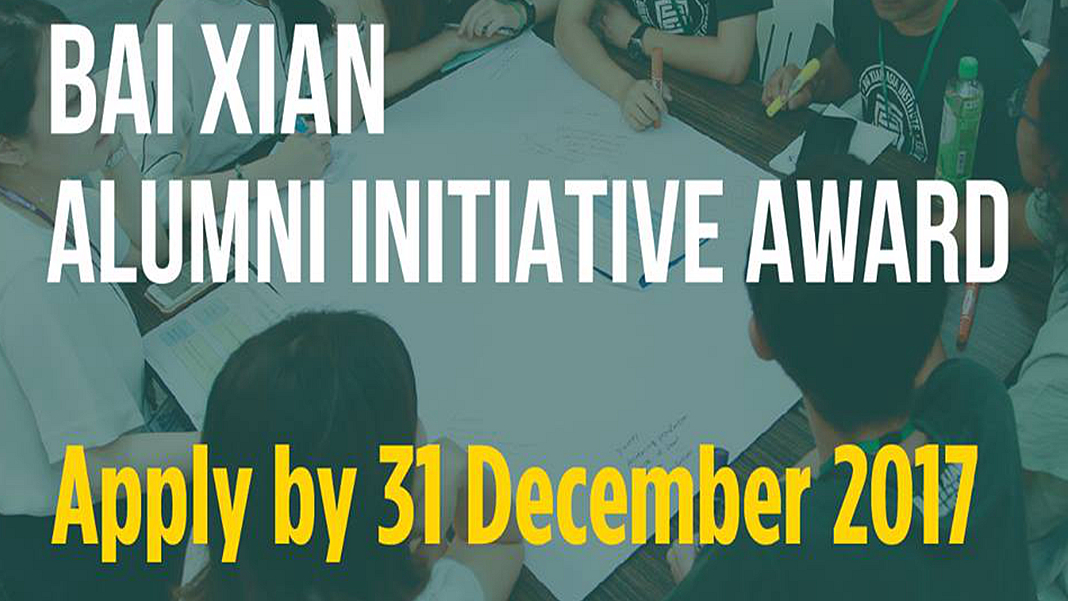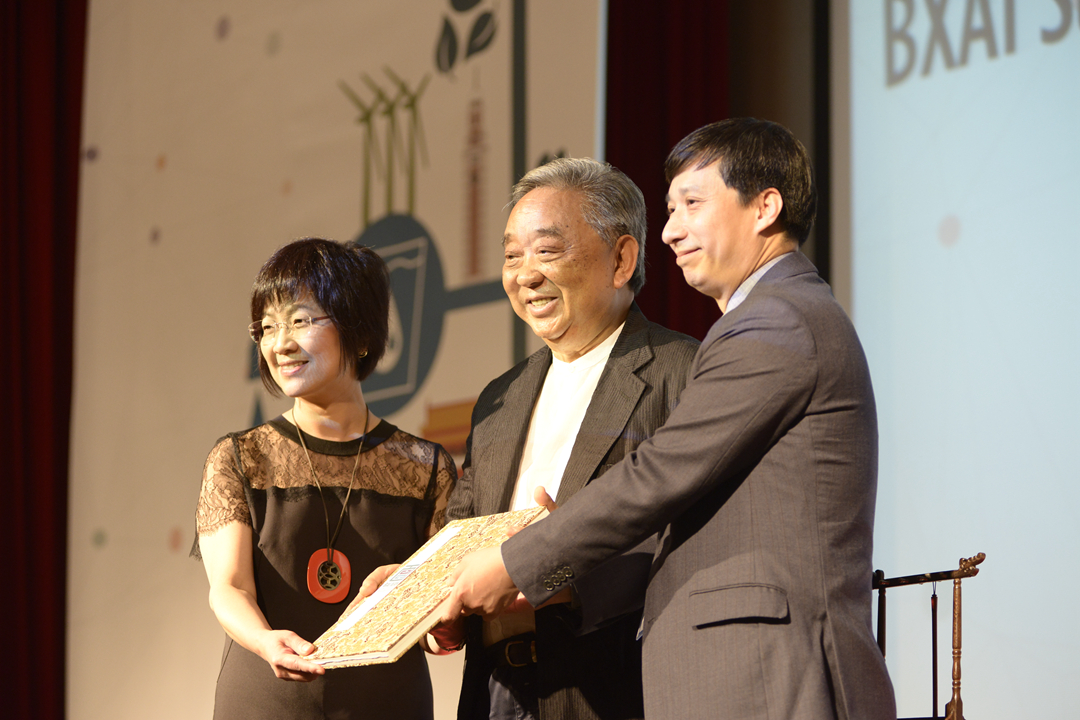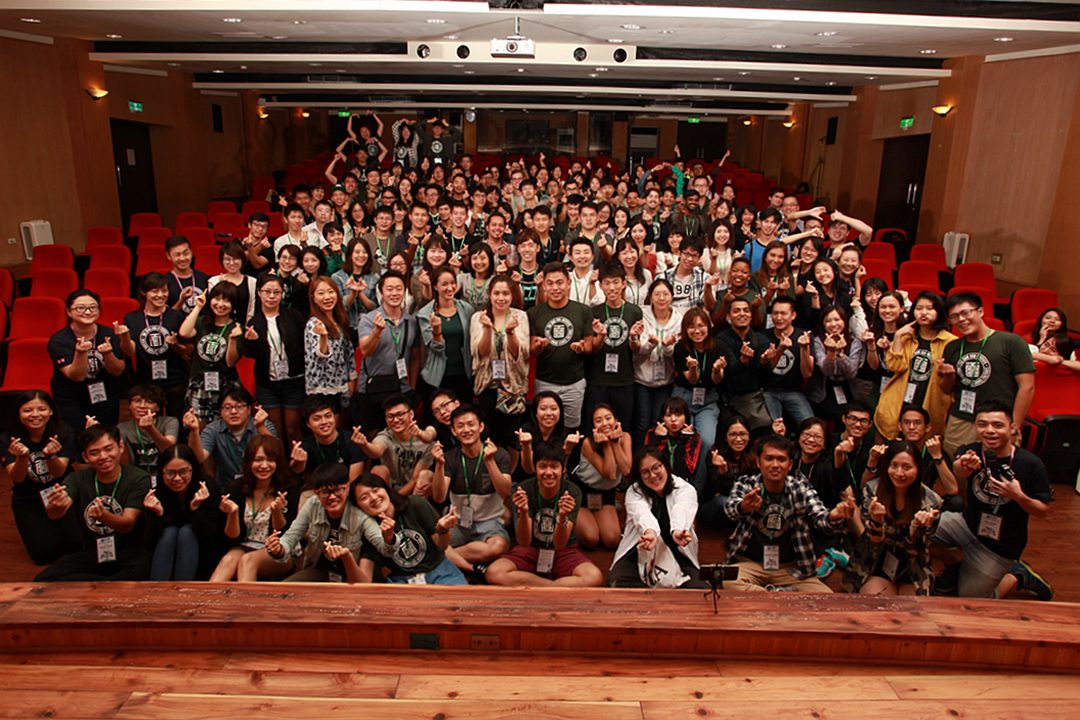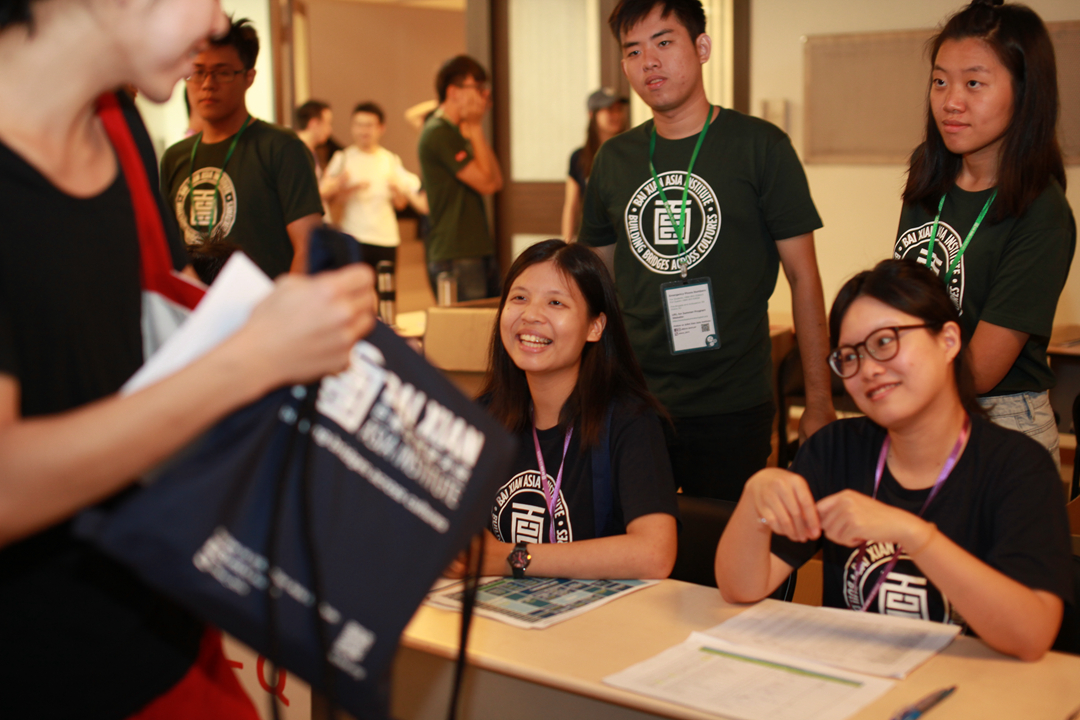Richard BRUBAKER
“I believe individuals can change the world, and change starts with a single step: understand there is a problem and make a decision to bring a solution to that problem.” Richard Brubaker, Founder & Managing Director of Collective Responsibility, shared how his career path shifted from a consultant to a social entrepreneur brought him to create social impact with passion, good teamwork and the right resources.
AFLSP Scholars Visit Sado Island
Our AFLSP Scholars and buddies from Waseda University went for a study trip to the Sado Island in Niigata prefecture, with professors and staff from the School of Political Science and Economics.
They visited some secondary school students and learned from the local government officers about the agricultural, forestry and fishery industries on the island.
One of the highlights of the trip was meeting Ms. Hitomi Soga, a Sado islander who was abducted with her mother to North Korea forty years ago, and eventually reunited with her family back in her hometown in 2004.
It was an unique experience to learn first-hand of this island lifestyle that is very different to ours!
AFLSP 2017 Selection Results
Name: | Applying for Program: | University: |
| TANG Lipei | Master of Philosophy in Communication | The Chinese University of Hong Kong |
| WANG Yun | PhD in Pharmacy | The Chinese University of Hong Kong |
| KIM Jinwoo | Bachelor of International Politics | Fudan University |
| TAMURA Yasutakai | Bachelor of Journalism | Fudan University |
| JIANG Xiaoyan | PhD in Medicine | Keio University |
| KIM Daum | Bachelor of Environment and Information Studies | Keio University |
| CHOI Dongik | Bachelor of Engineering (Aerospace Engineering) | Kyushu University |
| HAN Hoon | Doctoral Program of Engineering (Chemical Systems and Engineering) | Kyushu University |
| TANG Jiajie | Bachelor of Engineering (Civil Engineering) | Kyushu University |
| YOKOYAMA Azusa | Bachelor of Electronic Information in Microelectronics Science and Engineering | Shanghai Jiao Tong University |
| ASAKI Asami | Master of International Studies (Korean Studies Major) | Seoul National University |
| CHOU Hou In | Bachelor of Medicine and Bachelor of Surgery | The University of Hong Kong |
| HSU An-chu | Bachelor of Science (Natural Sciences) | The University of Hong Kong |
| LIAO Manqi | Master of Economics (Contemporary Economy) | The University of Tokyo |
| ZHENG Jiaxin | Master of Arts and Sciences (Interdisciplinary Information Studies) | The University of Tokyo |
| CHO Younghyou | Master of Management | Tsinghua University |
| NATSUME Hideo | Master of Public Administration | Tsinghua University |
| OHKAWA Satoshi | Master of Business Administration | Tsinghua University |
| SONG Wonyoung, Erin | Undergraduate Program of Experimental Class of Social Science | Tsinghua University |
| TSUTSUMI Hiroki | Master of Business Administration | Tsinghua University |
Prof. Shirley LIN
“To grab any opportunity you can and do the best…regardless of how big or how small the job is.” Prof. Shirley Lin of the Chinese University of Hong Kong shared how her career shifting from an investment banker to an academic researcher was driven by her passion on international politics and economy.
The Bai Xian Alumni Initiative Award 2018
Are you passionate about impacting social change?
Do you have an initiative you want to kick start?
Submit your entry for the 2018 Bai Xian Alumni Initiative Award, and embark on the exciting journey that could take your idea towards reality!
The Bai Xian Alumni Initiative Award is set up to encourage and support our alumni to develop socially responsible action plans meant to address the critical challenges faced by Asia’s communities, environments, and economies.
This year, the AIA is asking for action plans that address the following themes:(1) Environment and Sustainability(2) Social Innovation
Prizes:
The winning team will receive:
- A cash prize of US$2,500; and
- Seed funding of up to US $15,000 to be given only upon project execution, and in stages as determined by the proposed budget and project progress
Guidelines and Criteria:
- Team size of 3-6 persons
- Team Leader must be an AFLSP Scholar
- At least 50% of the team members must have completed the BXAI Summer Program
- Each team will need to identify for itself 1 academic mentor and 1 professional mentor (i.e. practitioner, NGO or business professional)
- Connection/partnership with NGOs/universities/on-the-ground practitioners is encouraged
- Cross-campus cooperation and teams comprising members from more than one of our partner universities are encouraged
Important Dates:
- 31 December, 2017: Submission of initial proposal and online application form [click]
- 28 February, 2018: Submission of draft project plan and preliminary budget
- 31 May, 2018: Submission of final project plan and revised budget
- 15 June, 2018: Announcement of finalists
- August 2018: Finalists’ presentation of action plans at the BXAI Summer Program to be held at Peking University
Points to Consider:
- Your personal capacity and time commitment
- Matching project needs with and team member’s unique skills and talents
- Time management
- Concise and clear project planning
- Difficulty in collaborating across different cities
- Accountability for proposed deliverables
- Reality vs. ideals
Submit your online AIA application form here [click]
To learn more please contact Agnes Yeung at [email protected]
All the best!
The BXAI Summer Program 2017
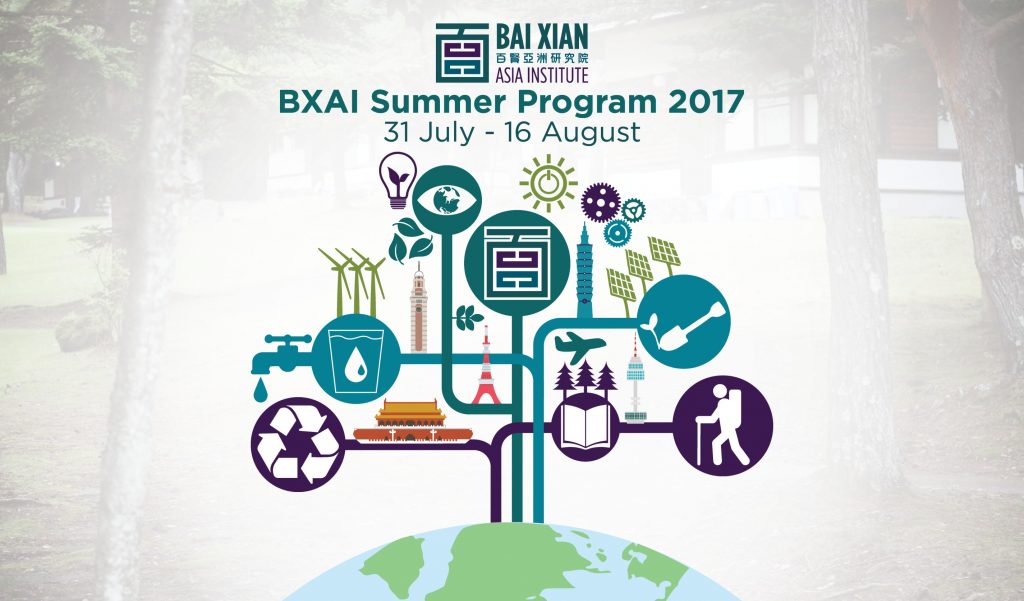
(Taipei, August 21, 2017) Bai Xian Asia Institute (BXAI) held its third BXAI Summer Program from July 31-August 16 to mobilize university students towards positive cross-cultural engagement and good citizenship. Taking place on the Taipei and Xitou Nature Education Area campuses of National Taiwan University (NTU), the two-and-a-half-week Program brought together 117 scholars enrolled in BXAI’s partner universities in Greater China, Japan and Korea to participate in constructive dialogue, establish mutual understanding, and develop lifelong friendships.
BXAI aims to realize its mission of building bridges across cultures through its Asian Future Scholarship Program (AFLSP). As one of the 16 partner universities in the AFLSP and this Summer Program’s host, NTU joins BXAI in promoting peace and progress through intercultural education.
Participants in the Summer Program had the opportunity to hear from and interact with more than 57 recognized leaders in the arts and sciences, politics, academia, non-profit and business. The networking of more than 200 people from the Bai Xian Community allowed participants to engage in stimulating team-building challenges, work together on group projects, develop personal and interpersonal skills, and foster deeper learning about East Asia’s most critical issues.
Students spent the first four days of the Program in NTU’s Xitou Nature Education Area, a large nature reserve in Taiwan’s mountainous Nantou County. Away from the hustle and bustle of city life, they climbed 7-storey trees, and learned how to farm and do woodwork while appreciating the remarkable beauty of their environment. The activities in Xitou were perfect for ice-breaking and team-building, and prepared the students well for the remaining time in Taipei. In addition to speaker sessions and panel discussions, students participated in problem solving activities at NTU’s D-school, visited the headquarters of O’right, an eco-friendly cosmetics company, and checked out the wide variety of offerings in Taipei’s famous night markets.
As the focus of this year’s Summer Program was “Sustainability and Entrepreneurship,” through panels led by distinguished experts, academics, and leaders, students learned about the social and environmental crises facing Asia, including mass urbanization and the unequal distribution of resources. The Scholars also joined social entrepreneurship workshops which aimed to equip them with the skills necessary to create start-ups that attempt to tackle Asia’s pressing challenges. Successful social entrepreneurs and professors imparted their wisdom and stories while teaching the importance of socially responsible business. Students also participated enthusiastically in public speaking and personal development workshops which helped them to prepare for their own social entrepreneurship pitches in the Final Presentations.
The Summer Program concluded on August 16 with a Closing Ceremony held at NTU’s Global Initiatives Symposium Convention Center. Professor Ching-Ray Chang, the University’s Interim President, told the audience how NTU and Bai Xian Asia Institute share the same mission for intercultural collaboration. Prof. Luisa Chang, Vice President for International Affairs, followed by expressing her joy watching participants grow and change throughout the Program.
Representing diverse fields of study, AFLSP Scholars from different regions in East Asia took to the stage and presented interesting monologues about their views, thoughts and multicultural experiences. Monica Nagashima and Judy You-shan Tsai reflected on their studies in energy and environmental science. Satoru Kishi and Yu Ruichuan asked guests to rise above their preconceptions, and listen to people regardless of their age, culture, or background. Lin Wan Wen and Kim Eun Seo followed with their perspectives on social entrepreneurship and responsibility. Finally, Shunzo Hayashi, Jisoo Lee, and Zaiwei Liu presented their plan to support underprivileged children living in rural areas of China.
Mr. Ronald Lee, Managing Director, Head of Private Wealth Management of Goldman Sachs (Asia) L.L.C. was then invited to give the Closing Ceremony’s keynote address. After sharing about his own Korean-American heritage, and how he has spent the past 24 years living and working in Asia, Mr. Lee drew on the lessons he had learned from working with entrepreneurs. From this he encouraged Scholars to constantly and persistently question their world, consider the wisdom of the crowd, and to believe in their own capacity to succeed.
As the Ceremony approached its end, Ms. Ronna Chao, CEO of Bai Xian Asia Institute, delivered her closing remarks:
“Although our time together has been relatively short, we hope that the experiences and opportunities we have intentionally designed into the Summer Program have ignited a number of important engines that will propel you along the many pathways you will travel in the future. Broaden your vision. Open your minds. Challenge your own views and beliefs. Listen to others with empathy. Cultivate understanding and relationships. Do things for meaning and impact, not for easy success and self-gratification. Enrich yourselves so that you can enrich others. Widen your circle of influence.”
The Closing Ceremony culminated in the presentation of Summer Program 2017 completion certificates to the Scholars, and the awarding of the first Alumni Initiative Award prize to team BRIDGE whose business proposal was to connect NGOs with companies, professional retirees, and students interested in utilizing their skills for tackling prevalent social issues. Amidst rounds of applause, Prof. Luisa Chang of NTU passed a Chinese calligraphy album to Prof. Lu Yang of Peking University, symbolizing the handing over of the hosting of the BXAI Summer Program 2018 to Peking University.
About BXAI
BXAI is a wholly independent, non-profit organization established in January 2014 with funding from Bai Xian Foundation, Mr. Ronald Chao’s private family foundation. Its establishment is grounded in the belief that education is the most effective catalyst to promote and achieve a prosperous, sustainable, and conflict-free modern Asia.
Through the development and implementation of the AFLSP, BXAI provides the preeminent intercultural and interdisciplinary educational platform in East Asia through its commitment to building a vibrant and collaborative community of scholars, alumni, academics, organizations, and individuals, who share BXAI’s core values, mission and vision.
In determining a robust strategic direction now and into the future, BXAI benefits greatly from the collective expertise and experience of the Bai Xian Community. It is BXAI’s vision that the Bai Xian Community will flourish and continue to inspire and be inspired, sharing its knowledge, support and connections.
About Asian Future Leaders Scholarship Program (AFLSP)
The AFLSP is a Pan-Asian initiative that enables young Asian scholars to study abroad in another Asian country, take part in an intercultural and interdisciplinary Enrichment Program, and connect with like-minded peers and leaders (together as the “Bai Xian Community”.) By way of granting up to 105 scholarships per year to elite students enrolled at 16 leading universities across 9 cities in Greater China, Japan, and Korea, the AFLSP supports their tuition and living expenses for undergraduate, MBA, or other Master’s/Doctoral degrees studies. The AFLSP aims at developing future leaders to embrace cultural diversity in Asia.
AFLSP encourages inter-regional student mobility, intercultural and interdisciplinary learning initiatives, and partnerships between Asian university campuses. All AFLSP Scholars receive either a 12-or-24-month scholarship for an undergraduate, MBA or Master’s/MPhil degree at one of our 16 partner universities (6 Anchor Universities and 10 Participating Universities):
6 Anchor Universities
Hitotsubashi University
Hong Kong University of Science and Technology
Kyoto University
Peking University
Waseda University
Zhejiang University
10 Participating Universities
Fudan University
Keio University
Kyushu University
National Taiwan University
Seoul National University
Shanghai Jiao Tong University
The Chinese University of Hong Kong
The University of Hong Kong
The University of Tokyo
Tsinghua University
The first cohort of AFLSP Scholars graduated in 2016. BXAI envisions the growth of a vibrant network of AFLSP alumni who collaborate on projects and initiatives across borders. The inaugural Alumni Initiative Award took place during BXAI Summer Program 2017 to encourage our alumni to develop socially responsible action plans.
Judged by a panel of distinguished business leaders, academics, and guests, BXAI Summer Program alumni gave competing pitches for a US $2500 cash prize and USD $5000-15,000 in seed funding. Team BRIDGE won the first Alumni Initiative Award with their proposal for an online platform that links regional NGOs with available talent.
Follow us:
Facebook/Instagram: @Bai Xian Asia Institute
Wechat: @bxai_2014
www.bxai.org
BXAI Summer Program 2017 James Column: August 6
After a four-hour drive through highways and steep winding roads, our students arrived at the Xitou Nature Education Center greeted by cool mountain air and afternoon mist. Untouched and boundless, the forest seemingly goes on forever. Ancient trees stretch towards the sky, ferns and moss cover the ground, waterfalls stream down from the peaks, and abundant wildlife make this beautiful place their home. Enthusiastic visitors of all ages regularly arrive by the busloads, decked out in hiking gear and bird-watching equipment, ready to explore.
Xitou is known in Taiwan as a summer resort. For our Scholars, this was their temporary home and classroom. In this beautiful and restorative environment, Scholars and guests were encouraged to experience and appreciate nature, build new friendships, and meditate on environmental sustainability. Taking advantage of the unique setting, a series of morning workshops were held to focus the students on their personal development.
At a plant nursery, our students worked together with hoes and spades to prepare soil for sowing. Exhausted and covered in mud, they went away with the satisfaction of planting saplings that would one day become tall trees. They also had a newfound respect for agriculture. “I will not take food for granted again,” said Bing Yuen, a Malaysian AFLSP Scholar at the Hong Kong University of Science and Technology. “I didn’t know how hard it was to grow food.”
In a woodworking class, students crafted special lamps out of local sustainable wood, which they sanded and polished themselves. After completing their creations, everyone was taken to “experience” a beautiful large-scale piece of woodwork: a double arched gingko wood bridge that took 3 years to build.
Perhaps the most gratifying of these activities was the tree-climbing workshop. After a quick lesson on identifying and avoiding dead branches, the participants strapped on their rope harnesses and pulled themselves up seven-story tall coniferous trees. Anxiety and trepidation disappeared with the loud encouragement of their peers below. As the climbers reached new altitudes, they were rewarded with breathtaking views of the Fenghuang Mountain Range in the distance.
“I’ve always been afraid of heights but I was able to overcome my fears,” said Benjamin Trnka, a Yenching Scholar from Peking University. “I really enjoyed looking at the forest ferns high up on the branches.”
At locations all across Xitou, including the iconic University Pond, team-building activities and often-hilarious games were held to encourage students to develop group skills and build trust. Meanwhile in the conference room of Red Tower, Angela Cheung, Managing Director of Asia Pacific Vision, gave a series of public speaking workshops that equipped students with effective presentation skills. With a new awareness about body language, how to make an intentional first impression and other key communication skills, the students were reinvigorated with a confidence to be themselves.
Many significant moments also occurred outside of the organized activities. Students spontaneously engaged in conversations over group meals, card games, excursions to nearby Monster Village, and hikes around the forest’s many trails. Participants asked each other about respective passions and cultural practices, openly listening to new viewpoints and personal stories. Disagreements led to further discourse, understanding and appreciation of their differences. The growing camaraderie is remarkable given the wide array of nationalities and backgrounds.
We wrapped up our stay in Xitou with an environmental panel with three inspiring experts and entrepreneurs. Dr. Hsiao-Wei Yuan showcased her work on the restoration of the Wu-Wei Harbor Wetland refuge and her research in regional bird ecology. Ms. Marine Thomas followed by explaining conservation and practices already undertaken in Hong Kong. Finally, Ms. Shahara Alexander shared about her permaculture work in Hong Kong, describing the benefits of community-supported agriculture (CSA) models and sustainable ecology.
A lively panel discussion followed where speakers took questions from the audience. Many thought-provoking questions were raised, including whether or not environmental responsibility would be feasible for disadvantaged people, and if man-made global warming could ever be reversed. The speakers acknowledged they that while difficult, environmental sustainability would indeed be possible if everyone stayed close with nature, consistently reduced waste, and moved to a plant-based diet.
We hope that the learning opportunities given to our Summer Program participants in the past week have planted seeds in their hearts and minds so that they will keep beautiful places like Xitou flourishing for generations to come.
BXAI Summer Program 2017 James Column: July 31
First Community Dinner
As over 120 Scholars and guests crowd into the unassuming basement of the Taipei Teacher’s Hostel there is a growing buzz of anticipation. “Why exactly are we all here?” students may ask, looking at the dozens of new faces sitting at their tables. After all, everyone in this room has been flown in for two-and-a-half weeks of experiential learning in Taiwan, plenty of investment in program design, coordination and detailed planning by Bai Xian Asia Institute. So why has BXAI deemed this event so necessary that they would go to such lengths to make it happen? The answer will be revealed as we follow the activities and reflections of the participants in the program.
Overwhelmed and a little travel weary, there is the typical awkward trepidation as students slowly introduce their names and universities. But as they begin talking about common understandings and surprising cultural experiences, this quickly transforms into laughter and cheers over generous servings of Taiwanese cuisine. There is certainly great diversity, that is obvious, but there is also tremendous commonality. Nervousness gives way to excitement as students wonder what the next few weeks will give them and where these new friendships will lead.
In this room you cannot make any safe assumptions about anyone’s background. Talking freely over dinner, students reveal surprising layers of movement and heritage that go far beyond their ethnicity or mother tongue. All of them have lived in countries different from the ones in which they were born. Some have found themselves caught between different cultures, not really sure where they stand. Many speak more than two languages.
As different and as diverse as these students may be, they all share a love for Asia and a willingness to branch out into the new. Hopefully they will carry this spirit of goodwill and adventure as they undergo their next two weeks in Taiwan.
BXAI Summer Program 2017 Kicks Off at Taiwan University on July 31!
In one week BXAI Summer Program 2017 will kick off at Taiwan University in Taipei! Over 120 students from 16 of our Anchor and Participating Universities will join us to learn, share ideas, and form lasting cross-cultural friendships as one community.
Centered around the theme of “Sustainability and Entrepreneurship,” BXAI Summer Program 2017 will take place in both Taipei and the Xitou Nature Education Area.
Here students will examine important environmental and sustainability issues while enjoying Taiwan’s natural beauty. They will also learn from the leading individuals of various industries and interests through a series of sessions, panels, and workshops.
We also look forward to hosting the very first Bai Xian Alumni Initiative Award pitch session! In this session two teams of competing BXAI Alumni will propose solutions to some of Asia’s most critical challenges.
